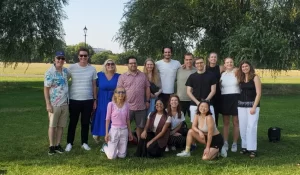By Graham Simmonds, Jump Chief Executive
I set up Jump in 2011 hoping to motivate lots of positive actions – from recycling to energy saving to sustainable commuting – carried out by lots of people across lots of different sectors; with all these individual actions adding up to a big cumulative impact.
So it’s very satisfying for me personally to have seen 15 million positive actions generated across all our client programmes since 2011. From our initial recycling engagement pilot with the London Borough of Bexley for residents on its Thamesmead Estate, we’re now providing 15 resident engagement programmes, 18 employee programmes and 6 student programmes. Our clients range from large global businesses like Barclays, to manufacturers, SMEs, NHS trusts, universities, councils and Government departments.
The story of Jump – and our next chapter
I couldn’t have got Jump started without the initial support of a small group of ‘mentors’ – family and friends who had confidence in me and my vision and were prepared to join me in putting up the initial investment plus much-needed ideas and emotional support. So a huge thank you to this small group (you know who you are!), and in particular my wife Karen and our wonderful daughters Alice and Elsie.
In April we took the decision to sell Jump to a newly created employee ownership trust. I’d been assessing the strategic options for our businesses for several months as I felt it was time for the founding investors to realise a return, as well as creating a stronger employee-led structure for our next phase of development.
I’m often told by our clients that my Jump team are great to work with – always responsive, keen to offer new ideas and like an extension of their own in-house team. Unprompted, I tend to hear this at least once a month which gives me a real buzz!
Reacting to a rapidly changing environment
Personally I’ve been so impressed by the way everyone in my team has responded to the Covid-19 crisis – we’ve had to adapt quickly to remote working ourselves whilst proactively flexing our client programmes to incorporate new home-working and wellbeing activities. It’s this kind of flexibility, creativity and drive from the team that is vital to our continued growth so it seems only right that everyone at Jump should share in our future success. Now the business is 100% owned by the Jump Employee Ownership Trust, everyone will be able to share in that success.
Employee ownership trusts (EOTs) are a relatively new model of corporate ownership and governance, and I feel we are at the start of a new mega-trend for forward-looking businesses. Much of our work with clients is about developing innovative ways to engage employees, so in many ways this new corporate structure is a perfect fit for our business model.
What the future holds for Jump
On a practical level, I’m not planning to go anywhere for some time and will be continuing as Jump’s chief executive. Our Product Director, Josh Cleall, and Programme Director, Bradley Williams, have been promoted to the Board, and all Jump employees are beneficiaries of the employee ownership trust. Our new Jump EOT Board is chaired by an independent director, Helen Craik who brings a wealth of experience in human resources and business management as well as an in-depth understanding of employee benefits and rewards through her previous role as Operations Director at Reward Gateway.
As a society we are obviously going through challenging and uncertain times with Covid-19, however Jump is financially strong as a company and in many ways our digital engagement service is ideal for the current times. I’m confident that whatever happens in the months and years ahead, our new employee ownership structure positions us very well to continue to grow and develop.








